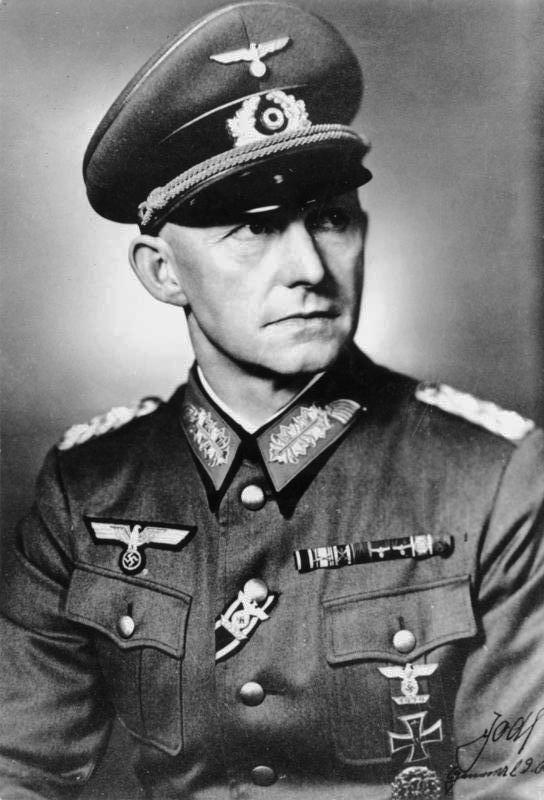Chief of the Wehrmacht; General Staff 30 June 1940
The Continuation of the War Against England
If political means will be without results England's will to resist will have to be broken by force.
(a) By making war against the English mother country.
(b) By extending the war to the periphery.
Regarding point (a), there are three possibilities:
(1) "Siege"
This includes war on the high sea and from the air against all shipments to and from England, the first against the English Airforce and all economic resources important to her war effort.
(2) Terror Attacks against English centers of population.
(3) A Landing of troops with the objective of occupying England.
Germany's final victory also over England is only a question of time. Hostile operational attacks of great strength are no longer possible. Germany, therefore, can choose a form of warfare which husbands her own strength and avoids risks.
The fight against the English Airforce must have top priority in order to lessen the destruction of bases essential to our war effort such finally to prevent it altogether. In order to achieve this the English Airforce must be brought down within the effective operational zone of our fighter planes or at least forced to retreat to its basis in Central England. Attempt to force it down in that region will hardly be successful.
With such actions, nevertheless a prerequisite is created for destroying all of Southern England with its armament factories and for lessening the effectiveness of English bombers against Western Germany. If we succeed in eliminating the aviation factories concentrated around London and Birmingham the English Airforce can no longer replace its losses. In such a case England would have reached the limit of its capabilities of action against Germany, since the blockade by the English fleet is of no decisive importance to us.
The first and most important objective in our war against England is to be supplemented by a concurrent Attack against English storage facilities and shipping on the high sea and in ports.
Together with propaganda and temporary terror attacks—said to be reprisal actions—this increasing weakening of English food supply will paralyze the will of her people to resist and finally break and thus force its government to capitulate.
A landing in England can only be contemplated after Germany has gained control of the air.
A landing in England, therefore, should not have as its objective the military conquest of the island an objective which can be obtained by the Luftwaffe and the German Navy. Its sole purpose should be to provide the coup de grace, if it should still be necessary, to a country whose war economy is already paralyzed and whose air force is no longer capable of action.
This situation will not occur before the end of August or the beginning of September.
We must count with an opposition of about 20 English divisions so that at least 30 German divisions will have to be embarked. '
The invasion nevertheless must be prepared in all details as a last resort.
An operational plan for it and the necessary preparations therefore are to be presented separately.
Addition to (b).
The war against the British Empire can only be carried out through or by other countries which are interested in its falling apart and hope for a substantial part of the spoils. These countries are primarily Italy, Spain, Russia and Japan. To activate these countries is a question of state craft. The military support of Italy and Spain is possible in a limited way (e.g. to mine the Suez Canal or the conquest of Gibraltar).
Besides the Arabic countries can be assisted by offering them "Defensive Means".
An Italian operation against the Suez Canal in conjunction with the conquest of Gibraltar thus sealing off the Mediterranean Sea, would be most effective.
In case Italy should intend to participate in the war against the British isles it can do so by employing its submarines based on the French coast or putting into action some of its fighter formations to be attached to the Luftwaffe. Elements of the Ground Forces are, from a purely military point of view, neither essential nor useful. The employment could only be a political gesture.
It is difficult to predict the time required for such operation.
Since England can no longer fight for victory but only for the preservation of its possessions and its world prestige, she should
1776-PS
according to all predictions, be inclined to make peace when she learns that she can still get it now at relatively little cost. Against a complete destruction England would fight to the bitter end.
[signed:] Jodi
Search the archive
Memorandum on military options to defeat England, including 1. a siege by naval and air forces, 2. "Terror Attacks" on English cities, 3. landing of troops to occupy the country, with the air campaign the key element; and possibilities for actions by German allies against British imperial territories (e.g., Gibraltar)
Authors
Alfred Jodl (chief of wehrmacht operations staff)
Alfred Jodl
German general and convicted war criminal (1890-1946)

- Born: 1890-05-10 (Würzburg)
- Died: 1946-10-16 (Nuremberg)
- Country of citizenship: German Reich; Kingdom of Bavaria; Weimar Republic
- Occupation: military personnel; politician
- Member of political party: Nazi Party
- Participant in: International Military Tribunal (role: defendant)
- Military rank: Generaloberst
- Military branch: artillery
Date: 30 June 1940
Literal Title: The Continuation of the War against England.
Defendant: Alfred Jodl
Total Pages: 2
Language of Text: English
Source of Text: Nazi conspiracy and aggression (Office of United States Chief of Counsel for Prosecution of Axis Criminality. Washington, D.C. : U.S. Government Printing Office, 1946.)
Evidence Code: PS-1776
HLSL Item No.: 452131